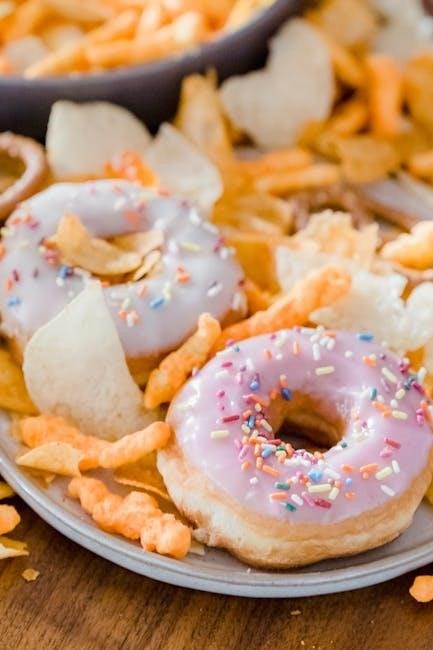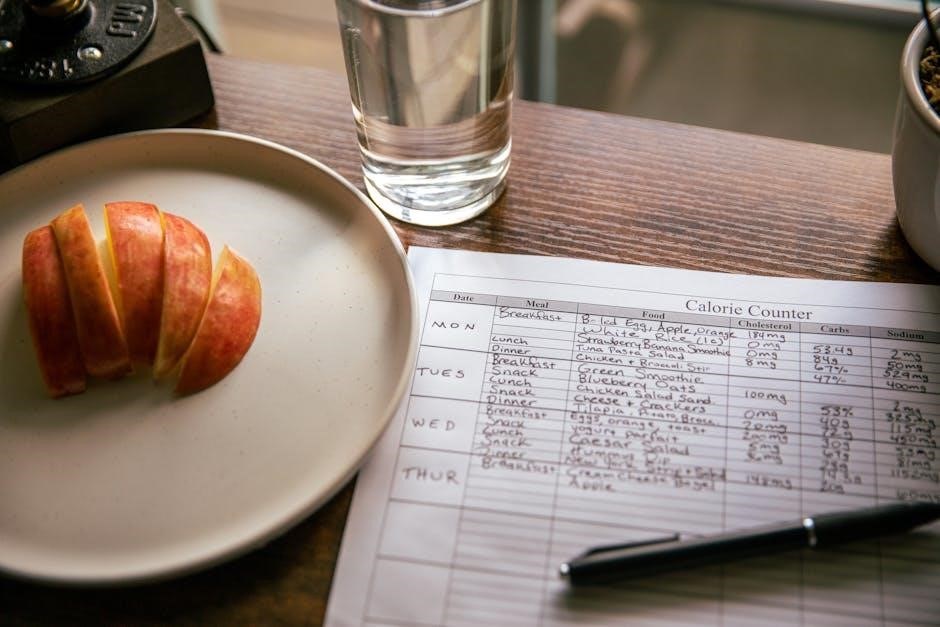A calorie deficit meal plan is a structured approach to consuming fewer calories than your body burns, promoting weight loss and fat reduction while maintaining nutrition.
What is a Calorie Deficit?
A calorie deficit occurs when you consume fewer calories than your body burns, creating an energy imbalance that promotes weight loss. This is achieved by eating less, exercising more, or a combination of both. The body compensates by using stored fat for energy, leading to fat reduction. A calorie deficit is essential for weight loss, as it forces the body to rely on stored energy reserves. It can be tailored to individual needs, ensuring nutrition is maintained while promoting a healthy weight. Understanding this concept is key to designing an effective meal plan.
Importance of Meal Planning for Weight Loss
Meal planning is crucial for successful weight loss as it helps control calorie intake and prevents unhealthy eating. By organizing meals in advance, individuals can ensure they consume the right amount of nutrients while staying within their calorie goals. This approach avoids impulsive food choices and promotes balanced nutrition. A well-structured meal plan also helps in portion control, reducing the risk of overeating. It allows for the distribution of calories throughout the day, maintaining energy levels and supporting overall health. Effective meal planning is a cornerstone of any weight loss strategy, making it easier to adhere to a calorie deficit diet and achieve long-term success.

Benefits of a Calorie Deficit Diet
A calorie deficit diet aids in fat reduction, improves blood sugar control, and boosts energy levels, promoting overall health and well-being through sustainable weight management.
Weight Loss and Fat Reduction
A calorie deficit is essential for weight loss as it forces the body to burn stored fat for energy. By consuming fewer calories than burned, fat reserves are depleted, leading to visible weight reduction. This approach not only helps shed pounds but also improves body composition. A structured meal plan ensures that the deficit is achieved safely, preventing excessive muscle loss. Consistency in maintaining this deficit is key to achieving and sustaining fat reduction goals. Additionally, incorporating protein-rich foods helps preserve muscle mass while promoting a leaner physique. This method is effective for those aiming to lose weight healthily and maintain long-term results.
Improved Blood Sugar Control
A calorie deficit meal plan can significantly improve blood sugar levels by reducing overall glucose intake and enhancing insulin sensitivity. By focusing on balanced meals with lean proteins, whole grains, and fiber-rich vegetables, the body absorbs sugars more slowly, preventing sharp spikes. This approach is particularly beneficial for those with diabetes or prediabetes, as it helps stabilize blood sugar fluctuations. Additionally, weight loss from a calorie deficit can further improve insulin function, reducing the risk of developing type 2 diabetes. Incorporating low-glycemic foods into the meal plan ensures sustained energy levels and better blood sugar management, promoting long-term metabolic health and reducing cravings for unhealthy snacks.
Enhanced Energy Levels
A calorie deficit meal plan can boost energy levels by optimizing nutrient intake and reducing blood sugar fluctuations. Balanced meals with lean proteins, whole grains, and fiber-rich foods provide sustained energy release, preventing midday slumps. Incorporating hydration and essential vitamins ensures metabolic efficiency, while avoiding excessive sugar and unhealthy fats reduces energy crashes. A well-structured plan focuses on nutrient-dense foods, which support cellular function and physical performance. This approach helps maintain consistent energy levels throughout the day, even while in a calorie deficit, making it easier to stay active and motivated during weight loss journeys.
How to Create a Calorie Deficit Meal Plan

Creating a calorie deficit meal plan involves calculating daily caloric needs, balancing macronutrients, and incorporating hydration and fiber-rich foods to ensure sustainable weight loss and overall health.
Understanding Daily Caloric Needs
Understanding your daily caloric needs is crucial for creating an effective calorie deficit meal plan. The body burns calories at different rates based on factors like age, gender, weight, height, and activity level. Typically, the average person burns around 1,600 to 2,000 calories per day, but this can vary. To achieve a calorie deficit, you need to consume fewer calories than your body burns. A safe and sustainable deficit is usually 500 calories per day, leading to about 1 pound of weight loss per week. Accurately calculating your caloric needs ensures that you create a realistic and maintainable meal plan for weight loss.

Macronutrient Balance: Protein, Carbs, and Fats
A well-balanced calorie deficit meal plan requires careful attention to macronutrients. Protein is essential for muscle maintenance and satiety, with recommendations of 1.6-2.2 grams per kilogram of body weight. Carbohydrates provide energy, focusing on complex sources like whole grains and vegetables. Fats, particularly healthy fats from avocados, nuts, and olive oil, support hormone production and overall health. Striking the right balance ensures nutrients are met while maintaining a calorie deficit, preventing muscle loss, and keeping energy levels stable. Proper macronutrient distribution is key to a sustainable and effective weight loss journey, ensuring both physical and mental well-being throughout the process.
Hydration and Fiber-Rich Foods
Hydration is critical for overall health and metabolism, especially when following a calorie deficit meal plan. Drinking plenty of water helps suppress appetite and boosts metabolic rate, aiding in fat loss. Incorporating fiber-rich foods like vegetables, fruits, and whole grains enhances satiety and digestion. High-fiber foods tend to be lower in calories but more filling, making them ideal for weight management. Staying hydrated and eating fiber-rich foods supports a balanced diet, prevents overeating, and maintains healthy gut function. These practices are essential for achieving and sustaining a calorie deficit while promoting long-term well-being and successful weight loss outcomes.

Sample Calorie Deficit Meal Plan
A well-structured meal plan includes balanced breakfast, lunch, and dinner options, such as eggs, whole wheat tortilla, grilled chicken, and cottage cheese, ensuring variety and nutrition.
Breakfast Options: Eggs, Whole Wheat Tortilla, and Low-Fat Yogurt
A nutritious breakfast is essential for starting your day right. Eggs provide high-quality protein and essential vitamins, while whole wheat tortilla offers fiber, keeping you full longer. Pairing these with low-fat yogurt adds probiotics and calcium, supporting digestive health without excess calories. This combination ensures a balanced and satisfying meal, aligning perfectly with a calorie deficit plan by controlling portion sizes and nutrient intake. Incorporating these options helps maintain energy levels and supports weight management goals effectively. This breakfast trio is both delicious and health-conscious, making it a great way to kick-start your day.
Lunch Ideas: Grilled Chicken, Veggies, and Sweet Potato
Grilled chicken, veggies, and sweet potato make an ideal lunch for a calorie deficit plan. Grilled chicken breast is lean and high in protein, helping to build and maintain muscle while keeping calories low. Veggies like broccoli, spinach, and bell peppers add fiber, vitamins, and antioxidants without excess calories. Sweet potatoes provide complex carbs for sustained energy and are rich in nutrients. This combination ensures a balanced meal that supports weight loss and overall health. Pairing these ingredients allows for portion control and variety, making it easier to stick to your calorie deficit goals while enjoying a flavorful and nutritious lunch.
Dinner Recipes: Cottage Cheese, Broccoli, and Lean Proteins
Cottage cheese, broccoli, and lean proteins like grilled chicken or turkey are excellent dinner options for a calorie deficit meal plan. Cottage cheese is low in fat and high in protein, aiding muscle maintenance and satiety. Broccoli adds fiber, vitamins, and antioxidants without extra calories. Pairing these with lean proteins ensures a balanced meal that supports weight loss. This combination keeps you full longer, helping to avoid unhealthy snacking. Incorporating these ingredients into your dinner routine aligns with your calorie deficit goals while providing essential nutrients for overall health and energy. This meal is both nutritious and flavorful, making it a great choice for sustainable weight loss.

Tips for Sustaining a Calorie Deficit Diet
Consistency is key to maintaining a calorie deficit diet. Regularly monitor your progress and adjust your caloric intake to avoid plateaus and ensure steady weight loss.
Monitoring Progress and Adjusting Caloric Intake
Regularly tracking your weight and measurements helps assess if your calorie deficit is effective. Adjust your daily caloric intake based on progress, ensuring sustainable weight loss without extreme hunger or fatigue. Use a food diary or app to log meals and stay accountable. If weight loss stalls, consider recalibrating your calorie needs or consulting a nutritionist. Consistent monitoring ensures you maintain a healthy balance, avoiding plateaus and staying motivated throughout your weight loss journey. Adjustments should be gradual to support long-term success and overall well-being.
Avoiding Unhealthy Snacks and Portion Control
Resisting unhealthy snacks is crucial for maintaining a calorie deficit. Opt for nutrient-dense options like fruits, nuts, or veggies to curb hunger without exceeding your daily calorie limit. Portion control is equally important, as overeating even healthy foods can hinder weight loss. Using smaller plates and measuring portions helps prevent mindless snacking. Planning snacks in advance ensures you stick to your diet plan. Avoiding processed foods and sugary treats reduces temptation and supports healthier eating habits. By controlling portions and choosing wholesome snacks, you can maintain a balanced diet and achieve your weight loss goals more effectively.
Consistency is key to successful weight loss and improved health. Stick to your calorie deficit meal plan and enjoy a healthier, more energized lifestyle.
Key Takeaways for Successful Weight Loss
Successful weight loss relies on maintaining a consistent calorie deficit while ensuring nutrient-dense meals. Planning balanced meals with protein, carbs, and fats helps avoid hunger and supports overall health. Incorporating fibre-rich foods aids in feeling full, preventing overeating. Regularly monitoring progress and adjusting caloric intake ensures the deficit remains effective without causing nutrient deficiencies. Hydration is crucial, as it boosts metabolism and suppresses appetite. Avoiding unhealthy snacks and practicing portion control are vital for staying on track. A well-structured meal plan not only promotes weight loss but also enhances energy levels and improves blood sugar control, leading to a sustainable healthier lifestyle.
The Role of Consistency in a Calorie Deficit Plan
Consistency is the backbone of a successful calorie deficit plan, ensuring steady progress toward weight loss goals. Regularly adhering to a structured meal plan helps maintain the deficit without extreme fluctuations, preventing metabolic slowdowns. Over time, consistent habits lead to sustainable fat loss and improved overall health. It fosters discipline, making healthier choices easier and reducing reliance on willpower. Consistency also allows the body to adapt, enhancing energy levels and mental clarity. By sticking to the plan, individuals build a routine that becomes second nature, making long-term weight management achievable and reducing the risk of rebound weight gain; Patience and persistence are key to lasting success.
